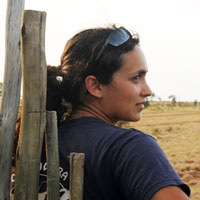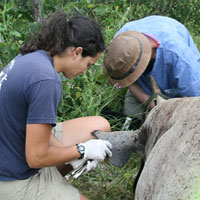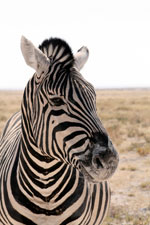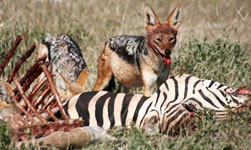

Pauline Kamath
Ph.D. Student
 Email: pkamath@nature.berkeley.edu
Email: pkamath@nature.berkeley.edu
Phone: 510-643-1227
Mailing Address: 137 Mulford Hall, #3114, University of California, Berkeley, CA 94720-3114
Office: VLSB, Room 5048
Lab: Environmental Genomics Facility, Hilgard Hall, Room 207
Ph.D. Environmental Science, Policy, and Management, UC Berkeley, Expected 2010
B.S. Biology, McGill University, 2000
Curriculum Vitae
Research
 My research interests include conservation biology, disease ecology, population genetics, and evolutionary ecology. Broadly, my goals are to better understand how infectious disease drives ecological dynamics in natural systems, and more specifically, how host-pathogen genetic interactions shape the histories of populations and species. I am also interested in how host genetic variation is related to disease susceptibility or resistance, and its effects on patterns of disease outbreaks in humans, livestock, and wildlife.
My research interests include conservation biology, disease ecology, population genetics, and evolutionary ecology. Broadly, my goals are to better understand how infectious disease drives ecological dynamics in natural systems, and more specifically, how host-pathogen genetic interactions shape the histories of populations and species. I am also interested in how host genetic variation is related to disease susceptibility or resistance, and its effects on patterns of disease outbreaks in humans, livestock, and wildlife.
 Anthrax, caused by the bacterium Bacillus anthracis, is a highly infectious and often fatal epizootic disease affecting mammals. Previous genetic studies suggest anthrax originated in sub-Saharan Africa and then spread to its current global distribution. Today, the number and severity of anthrax outbreaks in human, livestock, and wildlife populations have increased worldwide. Significant variation in the timing, severity, and prevalence of anthrax outbreaks across individuals, populations, and species has been well documented. My ongoing dissertation research investigates the relationship between host genetics and the observed variation in anthrax occurrence in free-ranging wildlife species of southern Africa.
Anthrax, caused by the bacterium Bacillus anthracis, is a highly infectious and often fatal epizootic disease affecting mammals. Previous genetic studies suggest anthrax originated in sub-Saharan Africa and then spread to its current global distribution. Today, the number and severity of anthrax outbreaks in human, livestock, and wildlife populations have increased worldwide. Significant variation in the timing, severity, and prevalence of anthrax outbreaks across individuals, populations, and species has been well documented. My ongoing dissertation research investigates the relationship between host genetics and the observed variation in anthrax occurrence in free-ranging wildlife species of southern Africa.
 Currently, I am examining how diversity and selection in functional host candidate genes, including those involved in both general immune response and response to anthrax infection, reflect the intensity and frequency of outbreaks within and across natural populations of plains zebra (Equus quagga). I am also extending this work to a broader scale by examining adaptive variation in an anthrax-related gene across resistant and susceptible host species in Etosha National Park, Namibia. By incorporating both neutral and adaptive loci, I aim to assess the relative contributions of pathogen-driven selection and demography on host population dynamics and evolution.
Currently, I am examining how diversity and selection in functional host candidate genes, including those involved in both general immune response and response to anthrax infection, reflect the intensity and frequency of outbreaks within and across natural populations of plains zebra (Equus quagga). I am also extending this work to a broader scale by examining adaptive variation in an anthrax-related gene across resistant and susceptible host species in Etosha National Park, Namibia. By incorporating both neutral and adaptive loci, I aim to assess the relative contributions of pathogen-driven selection and demography on host population dynamics and evolution.

